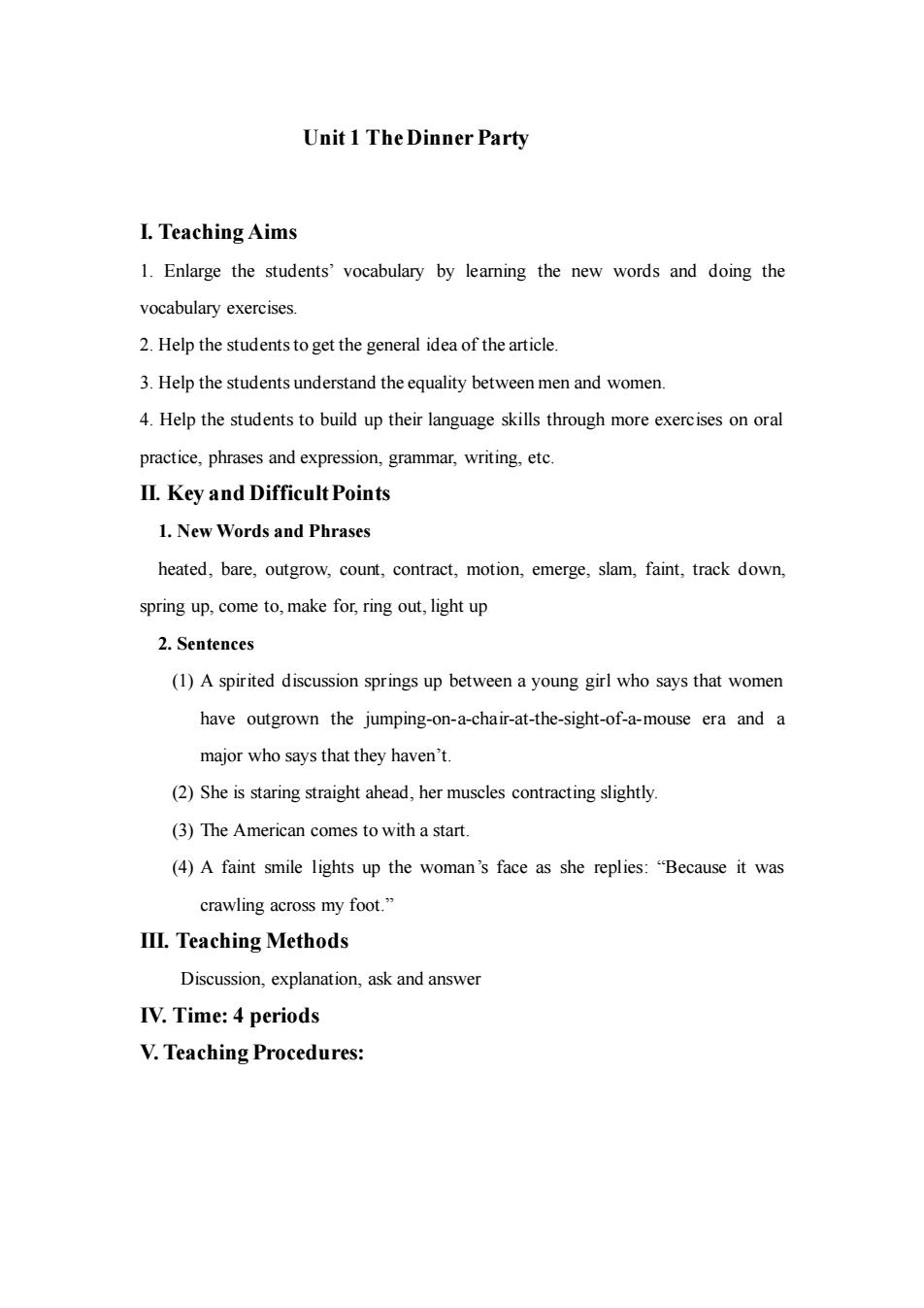
Unit 1 The Dinner Party I.Teaching Aims 1.Enlarge the students'vocabulary by leaming the new words and doing the vocabulary exercises. 2.Help the studentsto get the general idea of the article. 3.Help the students understand the equality between men and women 4.Help the students to build up their language skills through more exercises on oral practice,phrases and expression,grammar,writing,etc. II.Key and Difficult Points 1.New Words and Phrases heated,bare,outgrow,count,contract,motion,emerge,slam,faint,track down. spring up,come to,make for,ring out,light up 2.Sentences (1)A spirited discussion springs up between a young girl who says that women have outgrown the jumping-on-a-chair-at-the-sight-of-a-mouse era and a major who says that they haven't. (2)She is staring straight ahead,her muscles contracting slightly. (3)The American comes to with a start. (4)A faint smile lights up the woman's face as she replies:"Because it was crawling across my foot." III.Teaching Methods Discussion,explanation,ask and answer IV.Time:4 periods V.Teaching Procedures:
Unit 1 The Dinner Party I. Teaching Aims 1. Enlarge the students’ vocabulary by learning the new words and doing the vocabulary exercises. 2. Help the students to get the general idea of the article. 3. Help the students understand the equality between men and women. 4. Help the students to build up their language skills through more exercises on oral practice, phrases and expression, grammar, writing, etc. II. Key and Difficult Points 1. New Words and Phrases heated, bare, outgrow, count, contract, motion, emerge, slam, faint, track down, spring up, come to, make for, ring out, light up 2. Sentences (1) A spirited discussion springs up between a young girl who says that women have outgrown the jumping-on-a-chair-at-the-sight-of-a-mouse era and a major who says that they haven’t. (2) She is staring straight ahead, her muscles contracting slightly. (3) The American comes to with a start. (4) A faint smile lights up the woman’s face as she replies: “Because it was crawling across my foot.” III. Teaching Methods Discussion, explanation, ask and answer IV. Time: 4 periods V. Teaching Procedures:
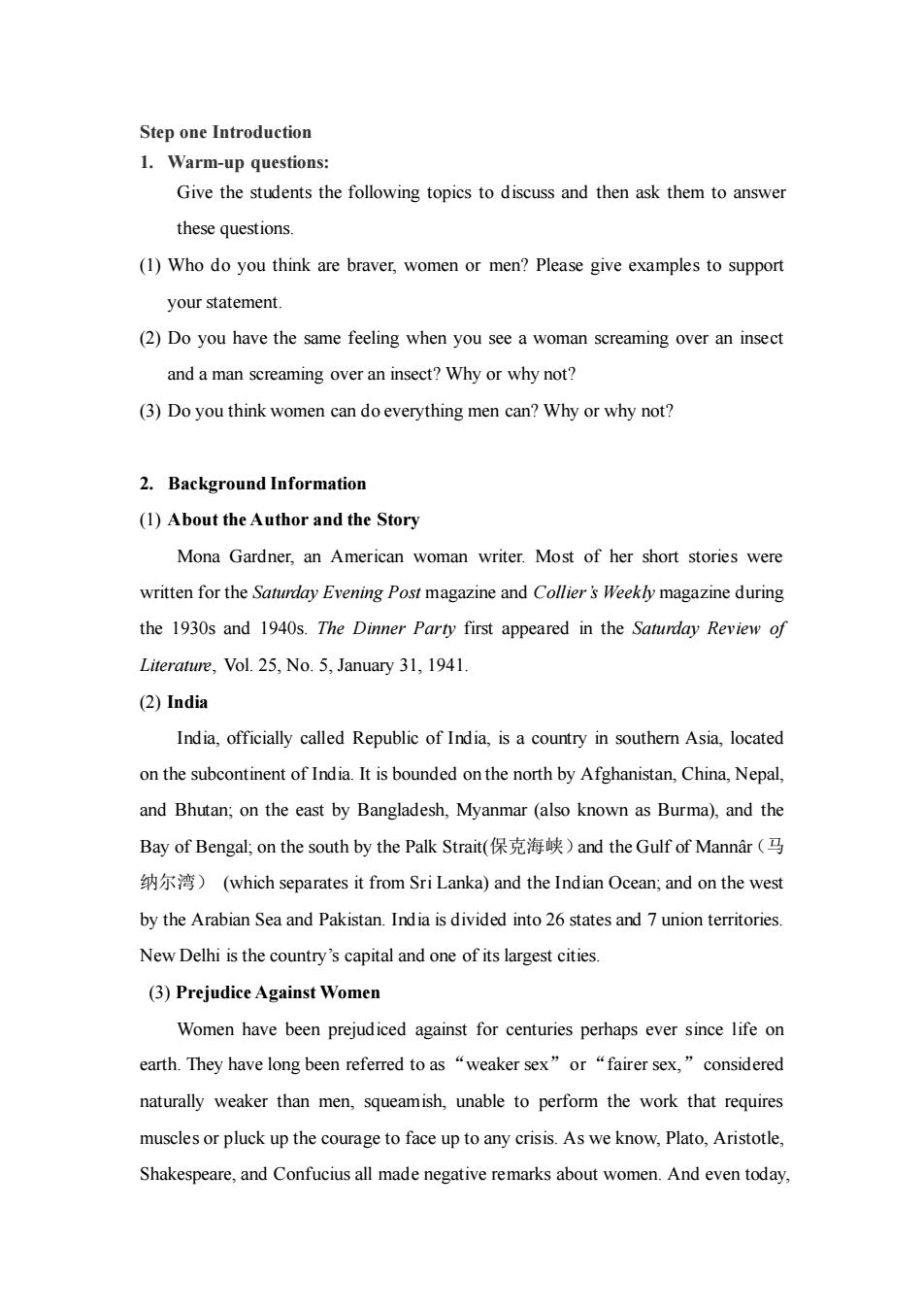
Step one Introduction 1.Warm-up questions: Give the students the following topics to discuss and then ask them to answer these questions (1)Who do you think are braver,women or men?Please give examples to support your statement. (2)Do you have the same feeling when you see a woman screaming over an insect and a man screaming over an insect?Why or why not? (3)Do you think women can do everything men can?Why or why not? 2.Background Information (1)About the Author and the Story Mona Gardner,an American woman writer.Most of her short stories were written for the Satrday Evening Post magazine and Collier Weekly magazine during the 1930s and 1940s.The Dinner Party first appeared in the Saturday Review of Literature,Vol.25,No.5,January 31,1941. (2)India India,officially called Republic of India,is a country in southem Asia,located on the subcontinent of India.It is bounded on the north by Afghanistan,China,Nepal, and Bhutan;on the east by Bangladesh,Myanmar(also known as Burma),and the Bay of Bengal;on the south by the Palk Strait((保克海峡)and the Gulf of Mannar(马 )(which separates it from Sri Lanka)and the Indian Ocean,and on the west by the Arabian Sea and Pakistan.India is divided into 26 states and 7 union territories. New Delhi is the country's capital and one of its largest cities. (3)Prejudice Against Women Women have been prejudiced against for centuries perhaps ever since life on earth.They have long been referred to as“weaker sex”or“fairer sex,”considered naturally weaker than men,squeamish,unable to perform the work that requires muscles or pluck up the courage to face up to any crisis.As we know,Plato,Aristotle. Shakespeare,and Confucius all made negative remarks about women.And even today
Step one Introduction 1. Warm-up questions: Give the students the following topics to discuss and then ask them to answer these questions. (1) Who do you think are braver, women or men? Please give examples to support your statement. (2) Do you have the same feeling when you see a woman screaming over an insect and a man screaming over an insect? Why or why not? (3) Do you think women can do everything men can? Why or why not? 2. Background Information (1) About the Author and the Story Mona Gardner, an American woman writer. Most of her short stories were written for the Saturday Evening Post magazine and Collier’s Weekly magazine during the 1930s and 1940s. The Dinner Party first appeared in the Saturday Review of Literature, Vol. 25, No. 5, January 31, 1941. (2) India India, officially called Republic of India, is a country in southern Asia, located on the subcontinent of India. It is bounded on the north by Afghanistan, China, Nepal, and Bhutan; on the east by Bangladesh, Myanmar (also known as Burma), and the Bay of Bengal; on the south by the Palk Strait(保克海峡)and the Gulf of Mannâr(马 纳尔湾) (which separates it from Sri Lanka) and the Indian Ocean; and on the west by the Arabian Sea and Pakistan. India is divided into 26 states and 7 union territories. New Delhi is the country’s capital and one of its largest cities. (3) Prejudice Against Women Women have been prejudiced against for centuries perhaps ever since life on earth. They have long been referred to as “weaker sex”or “fairer sex,”considered naturally weaker than men, squeamish, unable to perform the work that requires muscles or pluck up the courage to face up to any crisis. As we know, Plato, Aristotle, Shakespeare, and Confucius all made negative remarks about women. And even today
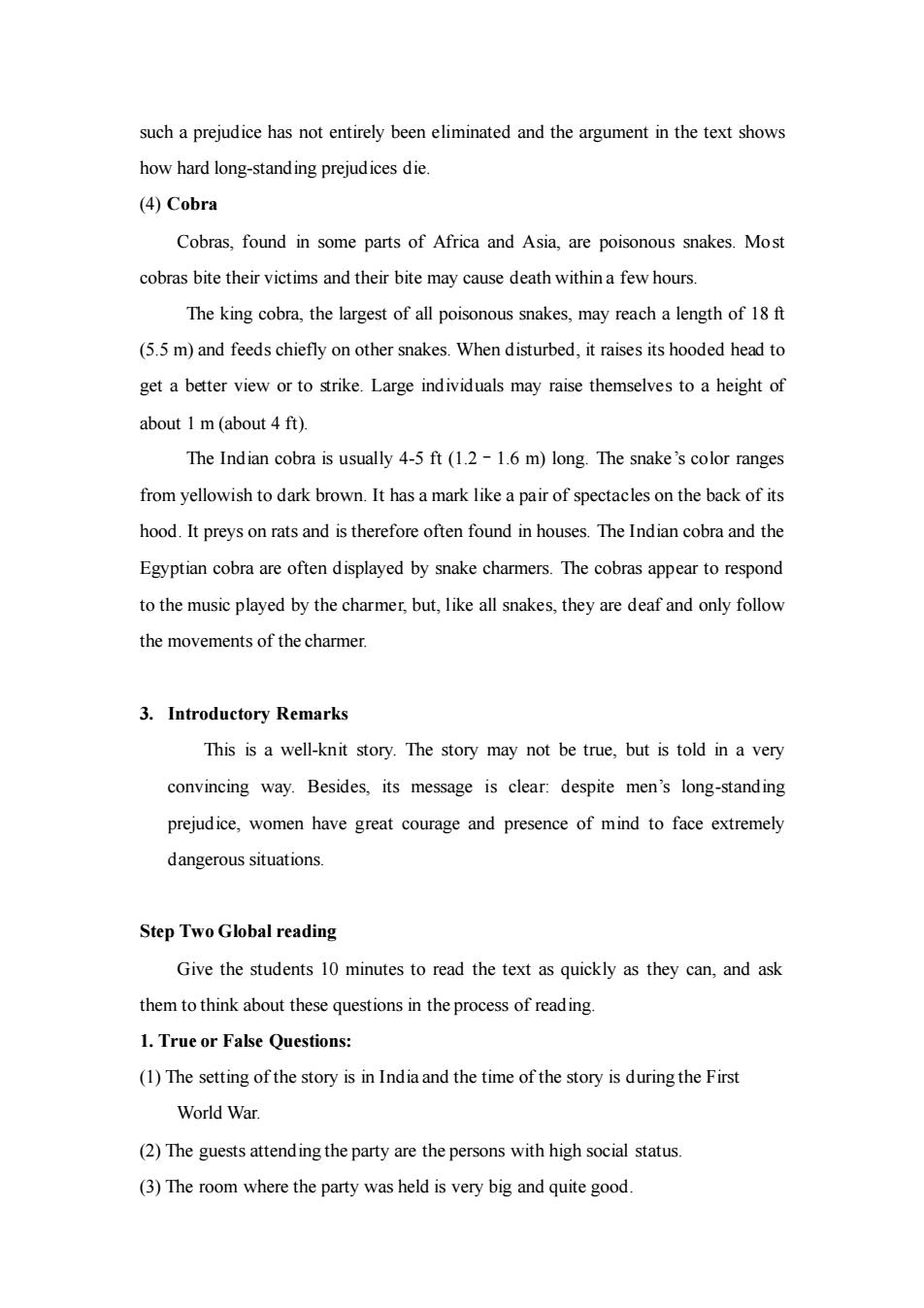
such a prejudice has not entirely been eliminated and the argument in the text shows how hard long-standing prejudices die. (4)Cobra Cobras,found in some parts of Africa and Asia,are poisonous snakes.Most cobras bite their victims and their bite may cause death within a few hours. The king cobra,the largest of all poisonous snakes,may reach a length of 18 ft (5.5 m)and feeds chiefly on other snakes.When disturbed,it raises its hooded head to get a better view or to strike.Large individuals may raise themselves to a height of about 1 m(about 4 ft). The Indian cobra is usually 4-5 ft(1.2-1.6 m)long.The snake's color ranges from yellowish to dark brown.It has a mark like a pair of spectacles on the back of its hood.It preys on rats and is therefore often found in houses.The Indian cobra and the Egyptian cobra are often displayed by snake charmers.The cobras appear to respond to the music played by the charmer,but,like all snakes,they are deaf and only follow the movements of the charmer. 3.Introductory Remarks This is a well-knit story.The story may not be true,but is told in a very convincing way.Besides,its message is clear:despite men's long-standing prejudice,women have great courage and presence of mind to face extremely dangerous situations. Step Two Global reading Give the students 10 minutes to read the text as quickly as they can,and ask them to think about these questions in the process of reading. 1.Trueor False Questions: (1)The setting of the story is in India and the time of the story is during the First World War. (2)The guests attending the party are the persons with high social status (3)The room where the party was held is very big and quite good
such a prejudice has not entirely been eliminated and the argument in the text shows how hard long-standing prejudices die. (4) Cobra Cobras, found in some parts of Africa and Asia, are poisonous snakes. Most cobras bite their victims and their bite may cause death within a few hours. The king cobra, the largest of all poisonous snakes, may reach a length of 18 ft (5.5 m) and feeds chiefly on other snakes. When disturbed, it raises its hooded head to get a better view or to strike. Large individuals may raise themselves to a height of about 1 m (about 4 ft). The Indian cobra is usually 4-5 ft (1.2–1.6 m) long. The snake’s color ranges from yellowish to dark brown. It has a mark like a pair of spectacles on the back of its hood. It preys on rats and is therefore often found in houses. The Indian cobra and the Egyptian cobra are often displayed by snake charmers. The cobras appear to respond to the music played by the charmer, but, like all snakes, they are deaf and only follow the movements of the charmer. 3. Introductory Remarks This is a well-knit story. The story may not be true, but is told in a very convincing way. Besides, its message is clear: despite men’s long-standing prejudice, women have great courage and presence of mind to face extremely dangerous situations. Step Two Global reading Give the students 10 minutes to read the text as quickly as they can, and ask them to think about these questions in the process of reading. 1. True or False Questions: (1) The setting of the story is in India and the time of the story is during the First World War. (2) The guests attending the party are the persons with high social status. (3) The room where the party was held is very big and quite good
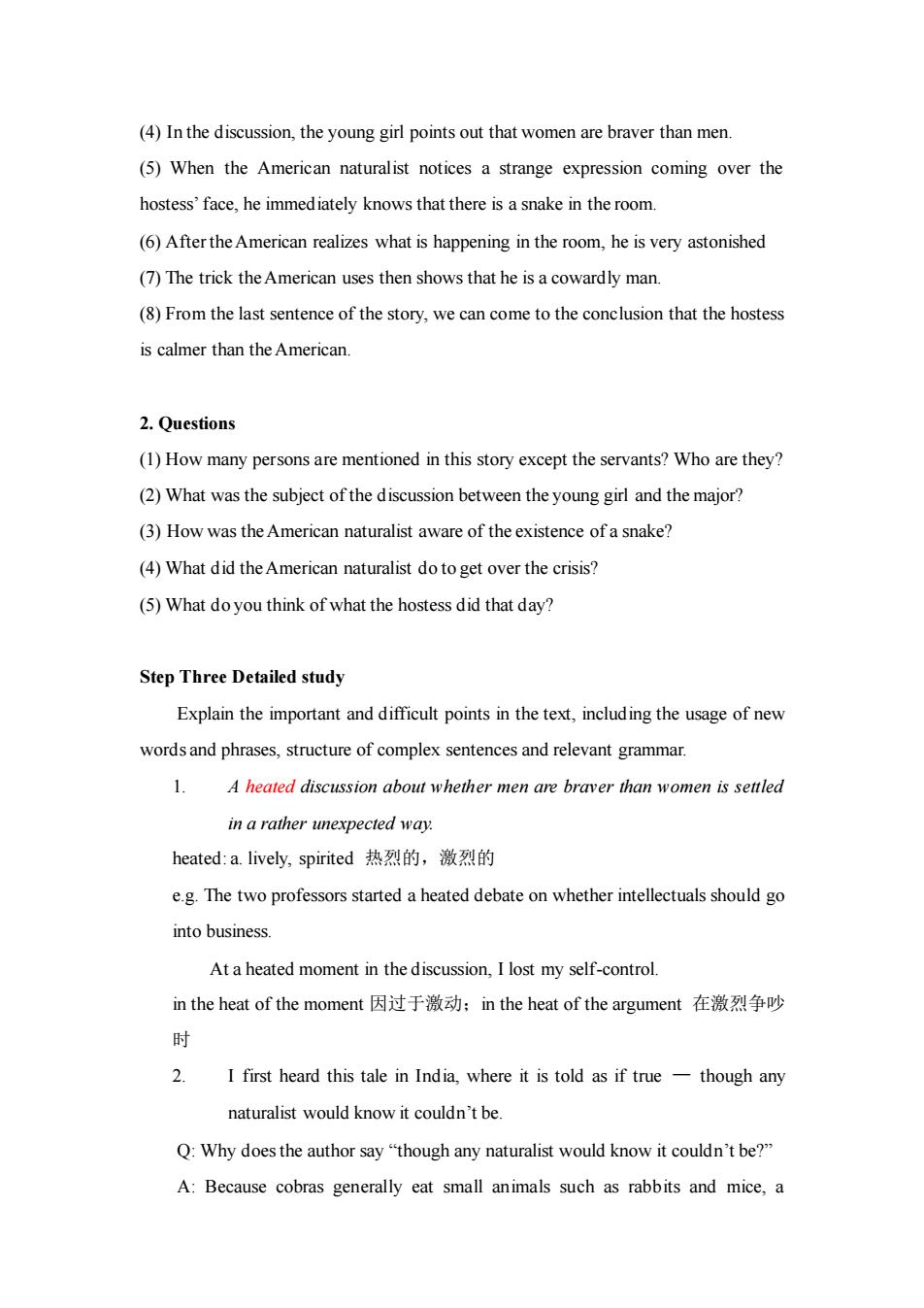
(4)In the discussion,the young girl points out that women are braver than men. (5)When the American naturalist notices a strange expression coming over the hostess'face,he immediately knows that there is a snake in the room (6)Afterthe American realizes what is happening in the room,he is very astonished (7)The trick the American uses then shows that he is a cowardly man. (8)From the last sentence of the story,we can come to the conclusion that the hostess is calmer than the American 2.Questions (1)How many persons are mentioned in this story except the servants?Who are they? (2)What was the subject of the discussion between the young girl and the major? (3)How was the American naturalist aware of the existence ofa snake? (4)What did the American naturalist do toget over the crisis? (5)What do you think of what the hostess did that day? Step Three Detailed study Explain the important and difficult points in the text,including the usage of new words and phrases,structure of complex sentences and relevant grammar 1.A heated discussion about whether men are braver than women is settled in a rather unexpected way. heated:a.lively,spirited热烈的,激烈的 e.g.The two professors started a heated debate on whether intellectuals should go into business. Ata heated moment in the discussion,I lost my self-control. in the heat of the moment因过于激动:in the heat of the argument在激烈争吵 时 2.I first heard this tale in India,where it is told as if true -though any naturalist would know it couldn't be. Q:Why does the author say"though any naturalist would know it couldn't be?" A:Because cobras generally eat small animals such as rabbits and mice,a
(4) In the discussion, the young girl points out that women are braver than men. (5) When the American naturalist notices a strange expression coming over the hostess’ face, he immediately knows that there is a snake in the room. (6) After the American realizes what is happening in the room, he is very astonished (7) The trick the American uses then shows that he is a cowardly man. (8) From the last sentence of the story, we can come to the conclusion that the hostess is calmer than the American. 2. Questions (1) How many persons are mentioned in this story except the servants? Who are they? (2) What was the subject of the discussion between the young girl and the major? (3) How was the American naturalist aware of the existence of a snake? (4) What did the American naturalist do to get over the crisis? (5) What do you think of what the hostess did that day? Step Three Detailed study Explain the important and difficult points in the text, including the usage of new words and phrases, structure of complex sentences and relevant grammar. 1. A heated discussion about whether men are braver than women is settled in a rather unexpected way. heated: a. lively, spirited 热烈的,激烈的 e.g. The two professors started a heated debate on whether intellectuals should go into business. At a heated moment in the discussion, I lost my self-control. in the heat of the moment 因过于激动;in the heat of the argument 在激烈争吵 时 2. I first heard this tale in India, where it is told as if true — though any naturalist would know it couldn’t be. Q: Why does the author say “though any naturalist would know it couldn’t be?” A: Because cobras generally eat small animals such as rabbits and mice, a
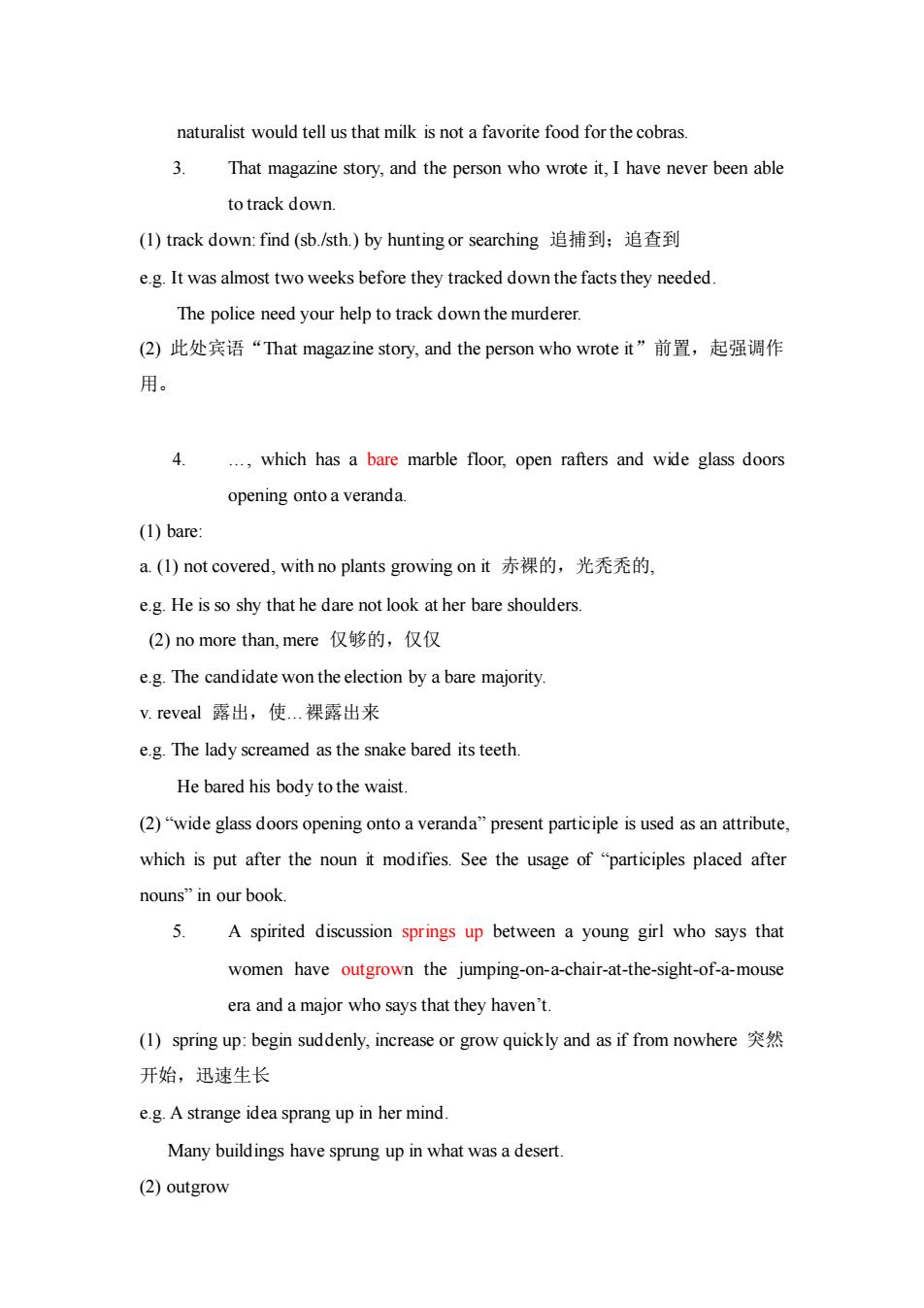
naturalist would tell us that milk is not a favorite food for the cobras. 3.That magazine story,and the person who wrote it,I have never been able to track down. (I)track down:find(sb.sth)by hunting or searching追捕到:追查到 e.g.It was almost two weeks before they tracked down the facts they needed. The police need your help to track down the murderer. (2)此处宾语“That magazine story,.and the person who wrote it”前置,起强调作 用。 g ...which has a bare marble floor,open rafters and wide glass doors opening onto a veranda (1)bare: a.(l)not covered,with no plants growing on it赤裸的,光秃秃的, e.g.He is so shy that he dare not look at her bare shoulders (2)no more than,mere仅够的,仅仅 e.g.The candidate won theelection by a bare majority. v.reveal露出,使..棵露出来 e.g.The lady screamed as the snake bared its teeth He bared his body to the waist. (2)"wide glass doors openingonto a veranda"present participle is used as an attribute. which is put after the noun it modifies.See the usage of"participles placed after nouns'”in our book 5.A spirited discussion springs up between a young girl who says that women have outgrown the jumping-on-a-chair-at-the-sight-of-a-mouse era and a major who says that they haven't (1)spring up:begin suddenly,increase or grow quickly and as if from nowhere 开始,迅速生长 e.g.A strange idea sprang up in her mind Many buildings have sprung up in what was a desert (2)outgrow
naturalist would tell us that milk is not a favorite food for the cobras. 3. That magazine story, and the person who wrote it, I have never been able to track down. (1) track down: find (sb./sth.) by hunting or searching 追捕到;追查到 e.g. It was almost two weeks before they tracked down the facts they needed. The police need your help to track down the murderer. (2) 此处宾语“That magazine story, and the person who wrote it”前置,起强调作 用。 4. …, which has a bare marble floor, open rafters and wide glass doors opening onto a veranda. (1) bare: a. (1) not covered, with no plants growing on it 赤裸的,光秃秃的, e.g. He is so shy that he dare not look at her bare shoulders. (2) no more than, mere 仅够的,仅仅 e.g. The candidate won the election by a bare majority. v. reveal 露出,使…裸露出来 e.g. The lady screamed as the snake bared its teeth. He bared his body to the waist. (2) “wide glass doors opening onto a veranda” present participle is used as an attribute, which is put after the noun it modifies. See the usage of “participles placed after nouns” in our book. 5. A spirited discussion springs up between a young girl who says that women have outgrown the jumping-on-a-chair-at-the-sight-of-a-mouse era and a major who says that they haven’t. (1) spring up: begin suddenly, increase or grow quickly and as if from nowhere 突然 开始,迅速生长 e.g. A strange idea sprang up in her mind. Many buildings have sprung up in what was a desert. (2) outgrow
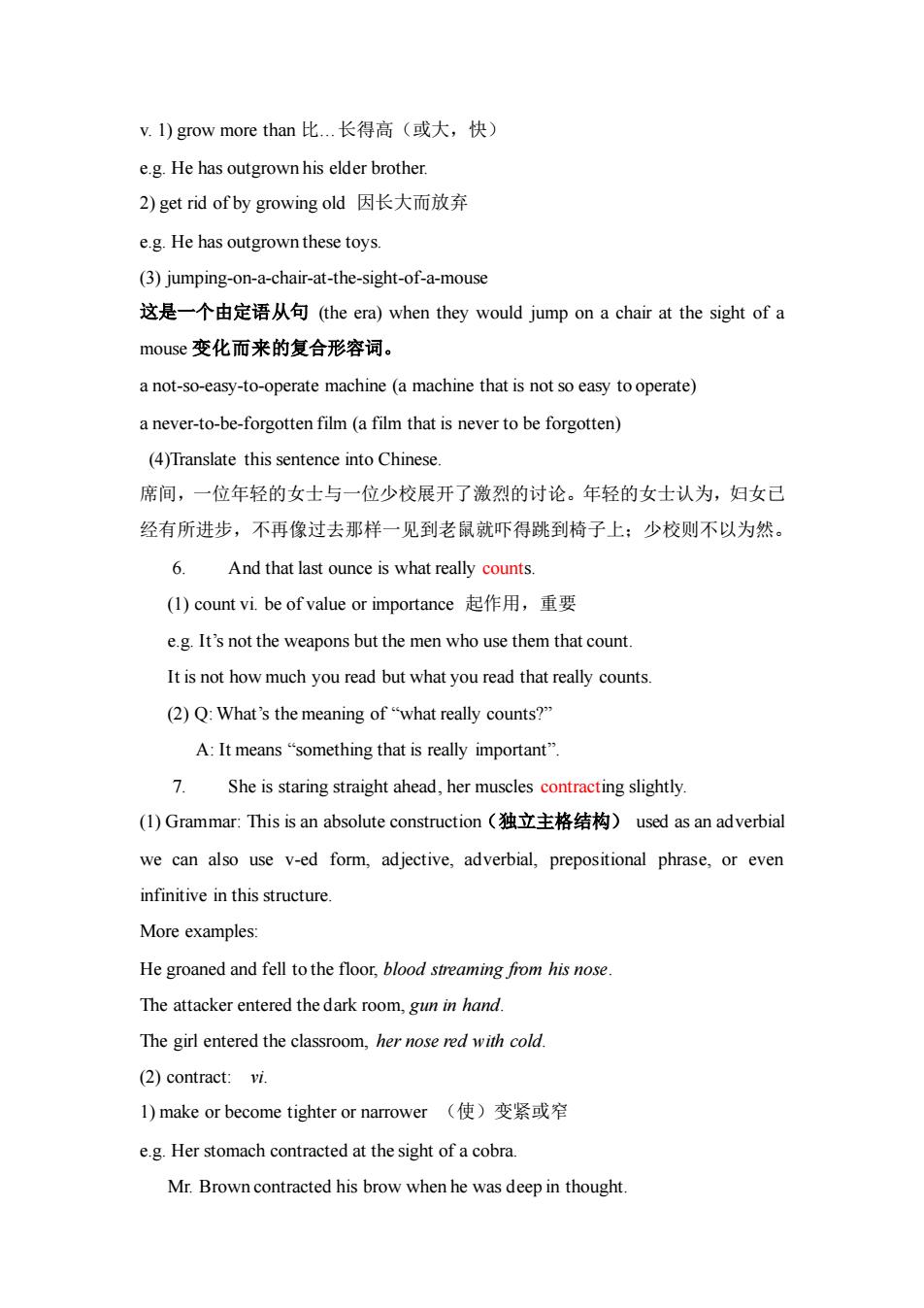
v.1)grow more than比.长得高(或大,快) e.g.He has outgrown his elder brother. 2)get rid of by growing old因长大而放弃 e.g.He has outgrown these toys. (3)jumping-on-a-chair-at-the-sight-of-a-mouse 这是一个由定语从句((the era)when they would jump on a chair at the sight of a mouse变化而来的复合形容词。 a not-so-easy-to-operate machine(a machine that is not so easy to operate) a never-to-be-forgotten film(a film that is never to be forgotten) (4)Translate this sentence into Chinese 席间,一位年轻的女士与一位少校展开了激烈的讨论。年轻的女士认为,妇女已 经有所进步,不再像过去那样一见到老鼠就吓得跳到椅子上;少校则不以为然。 6. And that last ounce is what really counts. ()count vi.be of value or importance起作用,重要 e.g.It's not the weapons but the men who use them that count. It is not how much you read but what you read that really counts (2)Q:What's the meaning of"what really counts?" A:It means"something that is really important" 7.She is staring straight ahead,her muscles contracting slightly. ()Grammar:This is an absolute construction(独立主格结构)used as an adverbial we can also use v-ed form,adjective,adverbial,prepositional phrase,or even infinitive in this structure. More examples: He groaned and fell tothe floor,blood streaming from his nose The attacker entered the dark room,gun in hand The girl entered the classroom,her nose red with cold. (2)contract:vi. I)make or become tighter or narrower(使)变紧或窄 e.g.Her stomach contracted at the sight of a cobra. Mr.Brown contracted his brow when he was deep in thought
v. 1) grow more than 比…长得高(或大,快) e.g. He has outgrown his elder brother. 2) get rid of by growing old 因长大而放弃 e.g. He has outgrown these toys. (3) jumping-on-a-chair-at-the-sight-of-a-mouse 这是一个由定语从句 (the era) when they would jump on a chair at the sight of a mouse 变化而来的复合形容词。 a not-so-easy-to-operate machine (a machine that is not so easy to operate) a never-to-be-forgotten film (a film that is never to be forgotten) (4)Translate this sentence into Chinese. 席间,一位年轻的女士与一位少校展开了激烈的讨论。年轻的女士认为,妇女已 经有所进步,不再像过去那样一见到老鼠就吓得跳到椅子上;少校则不以为然。 6. And that last ounce is what really counts. (1) count vi. be of value or importance 起作用,重要 e.g. It’s not the weapons but the men who use them that count. It is not how much you read but what you read that really counts. (2) Q: What’s the meaning of “what really counts?” A: It means “something that is really important”. 7. She is staring straight ahead, her muscles contracting slightly. (1) Grammar: This is an absolute construction(独立主格结构) used as an adverbial we can also use v-ed form, adjective, adverbial, prepositional phrase, or even infinitive in this structure. More examples: He groaned and fell to the floor, blood streaming from his nose. The attacker entered the dark room, gun in hand. The girl entered the classroom, her nose red with cold. (2) contract: vi. 1) make or become tighter or narrower (使)变紧或窄 e.g. Her stomach contracted at the sight of a cobra. Mr. Brown contracted his brow when he was deep in thought

2)make or become smaller or shorter(使)变小或短 e.g.Metal contracts as it cools. “Iam”is usually contracted to“T'm”in oral speech 3)settle or arrange by formal arrangement订立合同 e.g.Our shop contracted with a local clothing firm for 100 coats a week. 8.She motions to the native boy standing behind her chair and whispers something to him. (1)motion: 示意,打手势 v.give a signal by moving the hand or head;signal to sb. e.g.The nurse motioned with her finger for me to come Seeing Diana in the doorway,I motioned her to the room I)signal by hand or head(为传递信息用手或头做的)动作 e.g.He made a motion with his hand,as if to tell me to keep back 2)moving运动,移动 e.g.Never get on or off a bus while it is in motion. 3)proposal to be discussed and voted on at a meeting动议,提议 e.g.The motion put forward by the chairman was adopted /carried but the motion by me was rejected. 9.The American comes to with a start. (1)Paraphrase this sentence The American suddenly realizes what is happening and this startles him (2)What can we infer from this sentence? Before he sees a bowl of milk being placed on the veranda,the American naturalist always keeps a relaxed and somewhat indifferent manner (3)come to 1)be aware of,regain consciousness意识到,苏醒 e.g.The driver came to slowly after the accident. 2)(of an idea)occur to sb某人想到,想出 e.g.The idea came to me in the bath
2) make or become smaller or shorter (使)变小或短 e.g. Metal contracts as it cools. “I am” is usually contracted to “I’m” in oral speech. 3) settle or arrange by formal arrangement 订立合同 e.g. Our shop contracted with a local clothing firm for 100 coats a week. 8. She motions to the native boy standing behind her chair and whispers something to him. (1) motion: 示意,打手势 v. give a signal by moving the hand or head; signal to sb. e.g. The nurse motioned with her finger for me to come. Seeing Diana in the doorway, I motioned her to the room. n. 1) signal by hand or head (为传递信息用手或头做的)动作 e.g. He made a motion with his hand, as if to tell me to keep back. 2) moving 运动,移动 e.g. Never get on or off a bus while it is in motion. 3) proposal to be discussed and voted on at a meeting 动议,提议 e.g. The motion put forward by the chairman was adopted / carried but the motion by me was rejected. 9. The American comes to with a start. (1) Paraphrase this sentence. The American suddenly realizes what is happening and this startles him. (2) What can we infer from this sentence? Before he sees a bowl of milk being placed on the veranda, the American naturalist always keeps a relaxed and somewhat indifferent manner. (3) come to 1) be aware of, regain consciousness 意识到,苏醒 e.g. The driver came to slowly after the accident. 2) (of an idea) occur to sb 某人想到,想出 e.g. The idea came to me in the bath
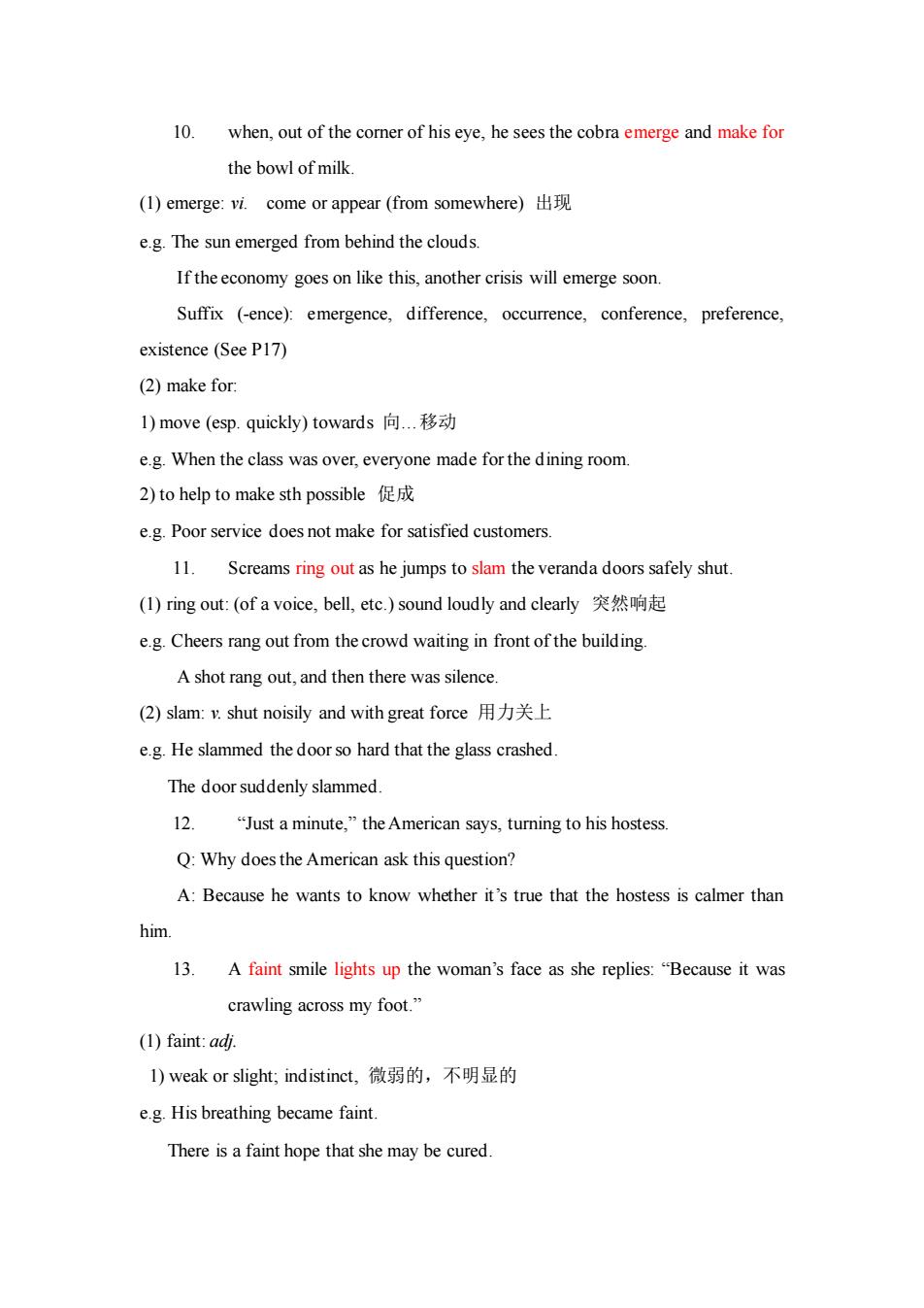
10.when,out of the corner of his eye,he sees the cobra emerge and make for the bowl of milk. (1)emerge:vi.come or appear(from somewhere) e.g.The sun emerged from behind the clouds. If the economy goes on like this,another crisis will emerge soon. Suffix (-ence):emergence,difference,occurrence,conference,preference. existence(See P17) (2)make for. 1)move(esp.quickly)towards向.移动 e.g.When the class was over,everyone made for the dining room 2)to help to make sth possible促成 e.g.Poor service does not make for satisfied customers. 11.Screams ring out as he jumps to slam the veranda doors safely shut. ()ring out:(of a voice,bel,etc.)sound loudly and clearly突然响起 e.g.Cheers rang out from the crowd waiting in front of the building. A shot rang out,and then there was silence. (2)slam:shut noisily and with great force用力关上 e.g.He slammed the door so hard that the glass crashed The door suddenly slammed. 12. "Just a minute,"the American says,turing to his hostess Q:Why does the American ask this question? A:Because he wants to know whether it's true that the hostess is calmer than him. 13.A faint smile lights up the woman's face as she replies:"Because it was crawling across my foot." (1)faint:adj. l)weak or slight,indistinct,.微弱的,不明显的 e.g.His breathing became faint There is a faint hope that she may be cured
10. when, out of the corner of his eye, he sees the cobra emerge and make for the bowl of milk. (1) emerge: vi. come or appear (from somewhere) 出现 e.g. The sun emerged from behind the clouds. If the economy goes on like this, another crisis will emerge soon. Suffix (-ence): emergence, difference, occurrence, conference, preference, existence (See P17) (2) make for: 1) move (esp. quickly) towards 向…移动 e.g. When the class was over, everyone made for the dining room. 2) to help to make sth possible 促成 e.g. Poor service does not make for satisfied customers. 11. Screams ring out as he jumps to slam the veranda doors safely shut. (1) ring out: (of a voice, bell, etc.) sound loudly and clearly 突然响起 e.g. Cheers rang out from the crowd waiting in front of the building. A shot rang out, and then there was silence. (2) slam: v. shut noisily and with great force 用力关上 e.g. He slammed the door so hard that the glass crashed. The door suddenly slammed. 12. “Just a minute,” the American says, turning to his hostess. Q: Why does the American ask this question? A: Because he wants to know whether it’s true that the hostess is calmer than him. 13. A faint smile lights up the woman’s face as she replies: “Because it was crawling across my foot.” (1) faint: adj. 1) weak or slight; indistinct, 微弱的,不明显的 e.g. His breathing became faint. There is a faint hope that she may be cured

2)feeling weak or tired and likely to lose consciousness虚弱无力,昏眩 e.g.He felt faint for lack of food. (2)light up: I)to become or cause to be bright with light or colourgive light to(使)光亮,放 光彩 e.g.The sun rose and began to light up the sky 2)(cause to)become bright with pleasure orexcitement喜形于色,喜气洋洋 e.g.Her face lighted/lit up when she heard the good news. (3)What can we learn from this sentence? The author just wants to come to the conclusion that in this story the hostess is calmer than the American.That's to say,sometimes women are calmer than men Step Four:Post-reading 1 Main idea of the text This story is written in chronological order.The tense of the story is the present tense.In the story,we may know that woman can face a crisis with perfect calmness and self-control as the hostess shows us 2 Structure Introduction (Para.1)introduction of the story:real or not Body(Para.3-8) the story:how a woman reacts to the crisis 3 Words and expressions V.Homework 1.Memorize the new words and phrases in the text 2.Do exercises on p6-17
2) feeling weak or tired and likely to lose consciousness 虚弱无力,昏眩 e.g. He felt faint for lack of food. (2) light up: 1) to become or cause to be bright with light or colour; give light to (使)光亮,放 光彩 e.g. The sun rose and began to light up the sky. 2) (cause to) become bright with pleasure or excitement 喜形于色,喜气洋洋 e.g. Her face lighted / lit up when she heard the good news. (3) What can we learn from this sentence? The author just wants to come to the conclusion that in this story the hostess is calmer than the American. That’s to say, sometimes women are calmer than men. Step Four:Post-reading 1 Main idea of the text This story is written in chronological order. The tense of the story is the present tense. In the story, we may know that woman can face a crisis with perfect calmness and self-control as the hostess shows us. 2 Structure Introduction (Para.1) introduction of the story: real or not Body (Para.3-8) the story: how a woman reacts to the crisis 3 Words and expressions V. Homework 1. Memorize the new words and phrases in the text. 2. Do exercises on p6-17

3.Leamn the text in"Reading Activity"by yourself. 4.Write a composition about 120 words describing how the hostess reacted to the crisis. VI.References 1.College English Intensive Reading 2,Zhai Xiangjun(ed.),Shanghai Foreign Language Education Press,2006 2.College English Intensive Reading 2,(Teacher's Book).Zhang Zengjian(ed.). Shanghai Foreign Language Education Press,2006. 3.Oxford Advanced Leamer's English-Chinese Dictionary (6th edition),Oxford university press&The Commercial Press,2004 4.大学英语语法.薄冰主编.山西:山西教育出版社,2006. 5.大学英语实用语法讲解与练习.任福洪等主编。北京:国防工业出版社, 2004
3. Learn the text in “Reading Activity” by yourself. 4. Write a composition about 120 words describing how the hostess reacted to the crisis. VI.References 1. College English Intensive Reading 2, Zhai Xiangjun(ed.), Shanghai Foreign Language Education Press, 2006. 2. College English Intensive Reading 2, (Teacher’s Book), Zhang Zengjian(ed.), Shanghai Foreign Language Education Press, 2006. 3. Oxford Advanced Learner’s English-Chinese Dictionary(6 th edition), Oxford university press﹠The Commercial Press, 2004. 4. 大学英语语法. 薄冰 主编. 山西:山西教育出版社,2006. 5. 大学英语实用语法讲解与练习. 任福洪等主编. 北京:国防工业出版社, 2004